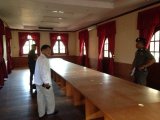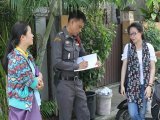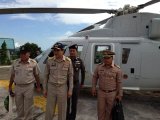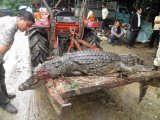PHUKET: A proposed amnesty law before Thailand's parliament should exclude people who ordered or carried out human rights abuses, Human Rights Watch said today.
The Thai government should affirm that prosecuting those responsible for rights abuses, regardless of rank or affiliation, is critical to promoting human rights, the rule of law, and lasting reconciliation in Thailand.
On August 7, 2013, the parliament will begin the first reading of an amnesty bill proposed by Worachai Hema, a member of parliament from the ruling Pheu Thai party of Prime Minister Yingluck Shinawatra.
''The ruling party's amnesty bill lets both soldiers and militants responsible for deaths during the 2010 upheaval off the hook,'' said Brad Adams, Asia director at Human Rights Watch.
''To ensure justice for the victims of violence and to end Thailand's longstanding culture of impunity, the amnesty bill should exclude perpetrators of abuses and instead make them accountable for their crimes.''
Worachai's bill broadly promises a full amnesty for all protesters who have been charged, prosecuted, and convicted for their actions against the state from the period since the coup that ousted Yingluck's brother, former Prime Minister Thaksin Shinawatra, on September 19, 2006, to May 10, 2011.
The amnesty would include people whose actions may have affected the lives and property of others but does not include protest leaders.
Worachai told Human Rights Watch on August 2, 2013, that his bill does not mention an amnesty for members of the military because not one soldier has been charged or prosecuted for the political violence from 2006 to 2011.
From March to May 2010, violent political confrontations took place between the United Front for Democracy against Dictatorship, popularly known as the Red Shirts, and the government of then-Prime Minister Abhisit Vejjajiva, in Bangkok and several provinces.
According to the Justice Ministry's Department of Special Investigation, at least 98 people lost their lives and more than 2000 were injured.
Worachai's proposal fails to address the need to hold both military personnel and elements of the UDD, particularly armed Black Shirt militants, accountable for violence and serious abuses in 2010, Human Rights Watch said.
A Human Rights Watch report, 'Descent into Chaos: Thailand's 2010 Red Shirt Protests and the Government Crackdown,' concluded that excessive and unnecessary force by the Thai army caused many deaths and injuries during the 2010 political confrontations. The security forces were responsible for the majority of deaths and injuries.
The high number of casualties - including unarmed demonstrators, volunteer medics and first responders, reporters, photographers, and bystanders - resulted in part from the enforcement of ''live fire zones'' around the UDD protest sites in Bangkok, where the army deployed sharpshooters and snipers.
The Department of Special Investigation announced in September 2012 that the military was responsible for 36 deaths.
So far, only nine cases have been submitted to the court for postmortem inquests. Five victims have been found to have been shot dead by soldiers acting under orders from the Center for the Resolution of the Emergency Situation.
Successive Thai governments have failed hold the military accountable, with not a single soldier or official prosecuted for their actions during the 2010 violence.
Shortly after taking office in 2011, Prime Minister Yingluck publicly vowed that her government would investigate and prosecute security force personnel responsible for abuses.
But since then, her government has repeatedly announced that military personnel would not be held responsible for casualties during the government's crackdown despite overwhelming evidence that soldiers shot people who posed no threat.
Despite the Department of Special Investigation's findings of the military's culpability for 36 deaths, department and police investigations and inquest rulings show that insufficient efforts have been made to identify the soldiers and commanding officers responsible for the shootings.
After receiving the inquest results, the department decided to charge only Abhisit and then-Deputy Prime Minister Suthep Thaugsuban for the killings.
Each has been charged with premeditated murder on the basis of command responsibility, which allows the prosecution of superiors for the actions of their subordinates.
Worachai's amnesty bill would provide immunity from prosecution to elements of the UDD, including Black Shirt militants who were responsible for deadly armed attacks on soldiers, police, and civilians.
These militants should be investigated, identified, and appropriately prosecuted. UDD leaders who incited violence with inflammatory speeches to demonstrators, urging them to carry out arson attacks and looting, should also be held accountable.
The status of investigations into alleged crimes by Black Shirt militants is now unclear, Human Rights Watch said.
The Department of Special Investigation no longer refers to a chart that it had frequently shown to the media when Abhisit was in power, identifying suspected Black Shirt militants and linking them with the 2010 violence.
The families of soldiers killed and wounded in the clashes say that they fear that those responsible will not be prosecuted.
Against this backdrop, some of the victims' families proposed another bill that specifies which actions will be granted an amnesty. Those who used violence or committed rights abuses would not be covered in the families' proposed law.
The draft legislation would also allow lawsuits against people or groups who killed people or damaged private property.
The prime minister's Pheu Thai party and the UDD have declined to support the families' bill. So far, the families have not been able to obtain the signatures of 20 members of parliament, which is needed for the bill to be formally presented to the speaker of the House of Representatives for consideration.
''Worachai's amnesty bill is an insult to the victims and families of the 2010 violence,'' Adams said.
''It is totally unacceptable that those who committed serious abuses, including soldiers who pulled the triggers and commanders who gave the orders, would remain untouchable through an amnesty.''
The Thai government should affirm that prosecuting those responsible for rights abuses, regardless of rank or affiliation, is critical to promoting human rights, the rule of law, and lasting reconciliation in Thailand.
On August 7, 2013, the parliament will begin the first reading of an amnesty bill proposed by Worachai Hema, a member of parliament from the ruling Pheu Thai party of Prime Minister Yingluck Shinawatra.
''The ruling party's amnesty bill lets both soldiers and militants responsible for deaths during the 2010 upheaval off the hook,'' said Brad Adams, Asia director at Human Rights Watch.
''To ensure justice for the victims of violence and to end Thailand's longstanding culture of impunity, the amnesty bill should exclude perpetrators of abuses and instead make them accountable for their crimes.''
Worachai's bill broadly promises a full amnesty for all protesters who have been charged, prosecuted, and convicted for their actions against the state from the period since the coup that ousted Yingluck's brother, former Prime Minister Thaksin Shinawatra, on September 19, 2006, to May 10, 2011.
The amnesty would include people whose actions may have affected the lives and property of others but does not include protest leaders.
Worachai told Human Rights Watch on August 2, 2013, that his bill does not mention an amnesty for members of the military because not one soldier has been charged or prosecuted for the political violence from 2006 to 2011.
From March to May 2010, violent political confrontations took place between the United Front for Democracy against Dictatorship, popularly known as the Red Shirts, and the government of then-Prime Minister Abhisit Vejjajiva, in Bangkok and several provinces.
According to the Justice Ministry's Department of Special Investigation, at least 98 people lost their lives and more than 2000 were injured.
Worachai's proposal fails to address the need to hold both military personnel and elements of the UDD, particularly armed Black Shirt militants, accountable for violence and serious abuses in 2010, Human Rights Watch said.
A Human Rights Watch report, 'Descent into Chaos: Thailand's 2010 Red Shirt Protests and the Government Crackdown,' concluded that excessive and unnecessary force by the Thai army caused many deaths and injuries during the 2010 political confrontations. The security forces were responsible for the majority of deaths and injuries.
The high number of casualties - including unarmed demonstrators, volunteer medics and first responders, reporters, photographers, and bystanders - resulted in part from the enforcement of ''live fire zones'' around the UDD protest sites in Bangkok, where the army deployed sharpshooters and snipers.
The Department of Special Investigation announced in September 2012 that the military was responsible for 36 deaths.
So far, only nine cases have been submitted to the court for postmortem inquests. Five victims have been found to have been shot dead by soldiers acting under orders from the Center for the Resolution of the Emergency Situation.
Successive Thai governments have failed hold the military accountable, with not a single soldier or official prosecuted for their actions during the 2010 violence.
Shortly after taking office in 2011, Prime Minister Yingluck publicly vowed that her government would investigate and prosecute security force personnel responsible for abuses.
But since then, her government has repeatedly announced that military personnel would not be held responsible for casualties during the government's crackdown despite overwhelming evidence that soldiers shot people who posed no threat.
Despite the Department of Special Investigation's findings of the military's culpability for 36 deaths, department and police investigations and inquest rulings show that insufficient efforts have been made to identify the soldiers and commanding officers responsible for the shootings.
After receiving the inquest results, the department decided to charge only Abhisit and then-Deputy Prime Minister Suthep Thaugsuban for the killings.
Each has been charged with premeditated murder on the basis of command responsibility, which allows the prosecution of superiors for the actions of their subordinates.
Worachai's amnesty bill would provide immunity from prosecution to elements of the UDD, including Black Shirt militants who were responsible for deadly armed attacks on soldiers, police, and civilians.
These militants should be investigated, identified, and appropriately prosecuted. UDD leaders who incited violence with inflammatory speeches to demonstrators, urging them to carry out arson attacks and looting, should also be held accountable.
The status of investigations into alleged crimes by Black Shirt militants is now unclear, Human Rights Watch said.
The Department of Special Investigation no longer refers to a chart that it had frequently shown to the media when Abhisit was in power, identifying suspected Black Shirt militants and linking them with the 2010 violence.
The families of soldiers killed and wounded in the clashes say that they fear that those responsible will not be prosecuted.
Against this backdrop, some of the victims' families proposed another bill that specifies which actions will be granted an amnesty. Those who used violence or committed rights abuses would not be covered in the families' proposed law.
The draft legislation would also allow lawsuits against people or groups who killed people or damaged private property.
The prime minister's Pheu Thai party and the UDD have declined to support the families' bill. So far, the families have not been able to obtain the signatures of 20 members of parliament, which is needed for the bill to be formally presented to the speaker of the House of Representatives for consideration.
''Worachai's amnesty bill is an insult to the victims and families of the 2010 violence,'' Adams said.
''It is totally unacceptable that those who committed serious abuses, including soldiers who pulled the triggers and commanders who gave the orders, would remain untouchable through an amnesty.''

















